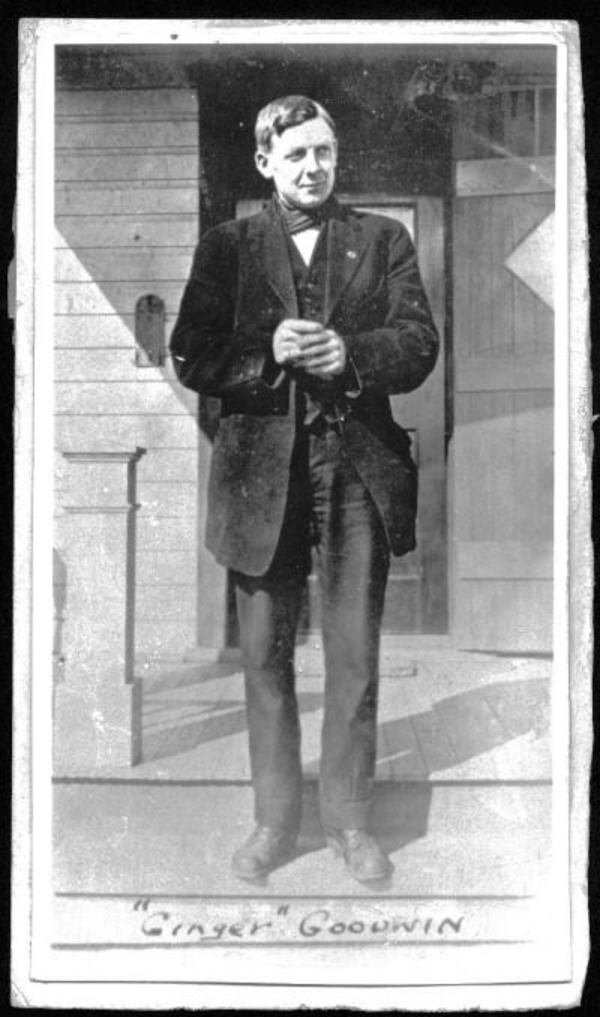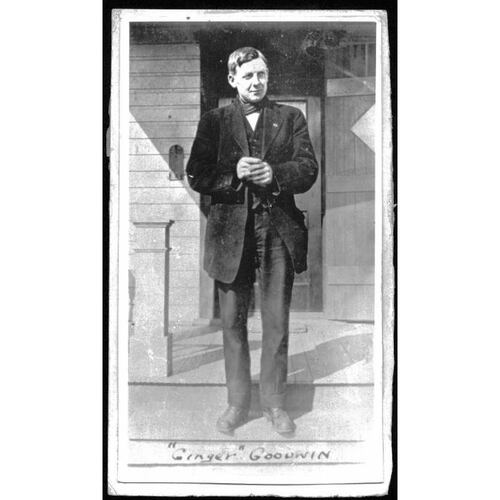As part of the funding agreement between the Dictionary of Canadian Biography and the Canadian Museum of History, we invite readers to take part in a short survey.

Source: Link
GOODWIN, ALBERT (Ginger), coalminer and union leader; b. 10 May 1887 in Treeton, England, fourth child of Walter Goodwin, a coalminer, and Mary Ann Brown; bachelor; shot to death 27 July 1918 near Cumberland, B.C.
In 1902, when he was 15, Ginger Goodwin started work at the Cadeby colliery in the West Riding of Yorkshire. He emigrated four years later to Glace Bay, N.S., where he worked at the Dominion No.2 Mine of the Dominion Coal Company Limited [see James Ross] and where he participated in the great strike of 1909–10, an unsuccessful effort by the United Mine Workers of America to obtain union recognition. In 1910 he moved to Michel, B.C., the site of several collieries owned by the Crow’s Nest Pass Coal Company Limited. There he starred in the local soccer club, which won the 1910 championship in the semi-professional Crow’s Nest Pass Football League.
Goodwin went on to Cumberland, near Nanaimo, in late 1910 or early 1911. He played occasionally for the Cumberland soccer team and worked as a mule driver and miner in No.5 Mine, Canadian Collieries (Dunsmuir) Limited. He took part in the UMWA’s unsuccessful strike for recognition in 1912–14, and the first record of his involvement in a union dates from this time: he was a delegate from the UMWA Cumberland local to the District 28 convention in 1913 and to the British Columbia Federation of Labour convention in 1914. Early in 1914 he was appointed an organizer for the Socialist Party of Canada. Unable to regain employment after the strike, he worked on relief on roadworks. He left Cumberland late in 1915 and signed on as a pony driver in No.1 East Mine of the Crow’s Nest Pass Coal Company at Coal Creek.
Early in 1916 Goodwin moved to Trail, where he worked for some months as a smelterman for the Consolidated Mining and Smelting Company of Canada Limited. He ran as the Socialist Party of Canada’s candidate in Trail in the provincial election of 1916 and came in third, polling 262 votes to the winner’s 626. On 18 Dec. 1916 he was elected full-time secretary of the Trail Mill and Smeltermen’s Union, a local of the International Union of Mine, Mill and Smelter Workers. The next year he was elected a vice-president of the British Columbia Federation of Labour, president of IUMMSW’s District 6, and president of the Trail Trades and Labour Council. Proposed by his union as deputy minister of British Columbia’s newly founded Department of Labour, he was supported by the trades and labour councils of both Victoria and Vancouver but was passed over.
Goodwin opposed World War I for political reasons: he believed that workers should not kill each other in economic wars. He registered for conscription as required by law, was medically examined, and was placed in category D (temporarily unfit). Shortly after, he led a strike at Trail to obtain the eight-hour day for smelter tradesmen. On 26 Nov. 1917, 11 days after the strike began, he received a telegram ordering a medical re-examination. Prime Minister Sir Robert Laird Borden* had just stated that there was “no likelihood” of men in categories B, C, D, and E being sent to war. “It is only men who have been included within Category A who can be called out for active service in the trenches,” he added. Re-examination changed Goodwin’s classification to category A (fit for combatant service overseas). The claim he made to dispensation because of ill health and value to his union was denied by the Trail exemption tribunal.
Goodwin’s last union function was attendance at the January 1918 convention of the British Columbia Federation of Labour. He was nominated for president but he declined to run. His appeal against conscription was rejected by a tribunal on 20 Jan. 1918. The final appeal was heard by Lyman Poore Duff* of the Central Appeal Tribunal, who denied it on 15 April 1918. Goodwin was ordered to report to army barracks, but he hid in the mountains west of Cumberland with others resisting conscription, who were supplied with food by friends.
On 27 July Goodwin was shot to death with a single bullet by Constable Daniel Campbell of the Dominion Police, one of three members of a police search-party looking for men who were evading the Military Service Act. Campbell claimed self-defence, saying Goodwin had pointed a rifle at him. Goodwin’s funeral on 2 August in Cumberland drew a mile-long procession and, in Vancouver on the same day, his death prompted British Columbia’s first general strike. Provincial police charged Campbell with manslaughter and produced witnesses who told the preliminary investigation that he had vowed to “get” the fugitives “dead or alive.” The trial at the fall assize was moved to Victoria from Nanaimo at the request of the defence. The grand jury in closed session returned “no bill,” that is, a refusal to commit Campbell for trial.
The strike Goodwin had led at Trail had been called off on 20 Dec. 1917 without its aim being achieved, but the next April the provincial government legislated the eight-hour day for all smelter workers, effective 31 March 1919.
The controversial nature of Ginger Goodwin’s death has prompted continuing speculation and suspicion; it has also focused attention on his short life and meteoric rise to trade-union leadership. His surviving writings show a rough-hewn assault on capitalism, a call for the achievement of a more just society through the replacement of private ownership of the means of production by production for use, not profit, and an anti-militarism that made him urge workers of all nations not to participate in economic wars. The methods he advocated for achieving the new society were “education, organization and agitation” and the election of members to legislatures. With Marxist rhetoric, he referred to wage slaves who “would rise up in rebellion and overthrow the master class.” He could also sound utopian, portraying post-capitalism as “the new age with its blossoms of economic freedom, happiness and joy for the world’s workers.” His union activity, like that of Frank Henry Sherman* in Alberta, showed a pragmatism which sought a more immediate redress of wrongs. The courage of Goodwin’s conviction in resisting militarism when he was conscripted during wartime, with what proved to be fatal consequence to himself, has been better appreciated in peacetime.
Albert Goodwin’s writings include several items in the Western Clarion (Vancouver): “The iron heel” (10 Aug. 1912), “Capitalism the leveller” (16 Aug. 1913), “Christians and socialists” (9 May 1914), “Civilization” (January 1917), and “Nationalism and internationalism” (June 1917), as well as a report on unemployment as a result of capitalism (11 April 1914) and an essay on the economic law of class (July 1916). A letter by Goodwin regarding political and educational prospects in the Crowsnest Pass appeared in the District Ledger (Fernie, B.C.) on 16 March 1914, and another, concerning capitalism and war, was published in the British Columbia Federationist (Vancouver) on 2 Nov. 1917. In addition, a speech given by Goodwin at Vancouver’s Rex Theatre was reported under the title “Socialism, the only hope” in the Vancouver Daily World, 20 Aug. 1917.
Family details were supplied to the author by Doris Goodwin of Conisbrough, South Yorkshire, England.
BCARS, Add. mss 15; Add. mss 2500; GR 419, vol.217, 1918, file 79; GR 684, box 1, file 6: 11a; GR 1327, no.151/18 (mfm.); GR 1566, R. v. Daniel Campbell, 1918 (mfm.). GA, M1561, file 427. General Register Office (London), Reg. of births, Treeton (Yorkshire), 10 May 1887. NA, RG 76, C, 1(b), Pretoria, 2 Sept. 1906. PRO, RG 12/3757 (New Fryston, Yorkshire) (mfm. at West Yorkshire Record Office, Wakefield Headquarters, Wakefield, Eng.). Sheffield Arch. (Sheffield, Eng.), St Helen’s (Treeton, Yorkshire), RBMB. British Columbia Federationist, 17 July 1914; 7 Sept., 14, 28 Dec. 1917; 1 Feb., 22 March, 9 Aug. 1918. Comox Argus (Courtenay, B.C.), 1 Aug. 1918. Cumberland News (Cumberland, B.C.), 24 Oct. 1911. Daily Colonist (Victoria), 2–3, 8–9 Aug. 1918. Daily News (Nelson, B.C.), 21 Nov., 1 Dec. 1917; 21 Jan. 1918. District Ledger, 23 April, 21 May, 18, 25 June, 9 July, 1 Oct. 1910; 28 Feb.–18 April 1914. Islander (Cumberland), 10 June, 9 Sept., 21 Oct. 1911; 17 July 1915. Nanaimo Free Press (Nanaimo, B.C.), 17 Dec. 1913. Rossland Daily Miner (Rossland, B.C.), 18 July 1916. Trail News (Trail, B.C.), 4, 18 Jan., 17 May, 2 Aug. 1918. Vancouver Daily Province, 2–3 Aug. 1918. Vancouver Daily Sun, 2–3 Aug. 1918. Vancouver Daily World, 2–3 Aug. 1918. Victoria Daily Times, 6 Sept. 1917; 2–3 Aug., 1–2 Oct. 1918. Western Clarion, 20 June 1914. B.C., Provincial Secretary, Voters’ lists (Victoria), 1911, Comox constituency; 1916, Trail constituency. CPG, 1917. Directory, N.S., 1907/8. M. B. Fox, United we stand: the United Mine Workers of America, 1890–1990 (Washington, 1990). J. E. MacFarlane, The Bag Muck Strike, 1902–1903 (Doncaster, Eng., 1987). Mary McRoberts, “The routing of radicalism: the 1917 Cominco strike,” Ascendant Historian (Victoria), 3 (1985): 66–107 (copy in Univ. of Victoria Library). Susan Mayse, Ginger: the life and death of Albert Goodwin (Madeira Park, B.C., 1990). Miners’ Magazine (Denver, Colo), April 1917. John Norris, “The Vancouver Island coal miners, 1912–1914: a study of an organizational strike,” BC Studies, no.45 (spring 1980): 56–72. Stanley Scott, “A profusion of issues: immigrant labour, the World War, and the Cominco strike of 1917,” Labour (Halifax), 2 (1977): 54–78. A. J. Wargo, “The great coal strike: the Vancouver Island coal miners’ strike, 1912–14” (ba thesis, Univ. of B.C., Vancouver, 1962).
Cite This Article
Roger Stonebanks, “GOODWIN, ALBERT (Ginger),” in Dictionary of Canadian Biography, vol. 14, University of Toronto/Université Laval, 2003–, accessed March 28, 2025, https://www.biographi.ca/en/bio/goodwin_albert_14E.html.
The citation above shows the format for footnotes and endnotes according to the Chicago manual of style (16th edition). Information to be used in other citation formats:
| Permalink: | https://www.biographi.ca/en/bio/goodwin_albert_14E.html |
| Author of Article: | Roger Stonebanks |
| Title of Article: | GOODWIN, ALBERT (Ginger) |
| Publication Name: | Dictionary of Canadian Biography, vol. 14 |
| Publisher: | University of Toronto/Université Laval |
| Year of revision: | 1998 |
| Access Date: | March 28, 2025 |



